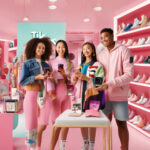Luxury brands like LVMH and Kering are now confronting a significant challenge in China: an expanding grey market that offers brand-new, authenticated luxury items at discounts of up to 40%. This shift is largely driven by consumers’ growing price sensitivity and fluctuating currency exchange rates, making platforms like Dewu increasingly popular.
The statistics are telling. In the first half of 2024, sales of Louis Vuitton products on Dewu surged by 11%, totaling 2.6 billion yuan (approximately $358 million). This figure represents over 14% of Louis Vuitton’s estimated total sales in China, which amounted to €2.3 billion ($2.5 billion) during the same timeframe. Similar trends are observed with brands like Christian Dior, Hermès, and Chanel, indicating that Dewu plays a significant role in the luxury resale market.
Dewu’s rise spells trouble for major luxury houses that are already facing stagnant growth in China. While these authenticated products add to brands’ revenues when sold overseas, they simultaneously squeeze profit margins and undermine the considerable investments these brands have made in their Chinese operations.
Parallel to this trend are Chinese tourists who prefer shopping abroad, particularly in Japan, due to favorable currency exchange rates. LVMH executives noted that while there remains a strong interest in their brands among Chinese consumers, the profit impact is clear—they are experiencing a notable decline in sales within Mainland China.
The grey market on sites like Dewu is a product of various factors, including excessive luxury inventory due to miscalculations of post-Covid demand. This oversupply dilutes the exclusivity that luxury brands strive to maintain, encouraging savvy consumers to seek the best deals, even on luxury items. As the dynamics of the luxury market shift, brands must adapt to this new reality or risk losing their market share.












